Many marathon runners are weekend warriors, stuck at a desk all week before putting in long pavement miles. However, incorporating hiking before a marathon provides added fitness benefits that pave the way for new personal records. Follow this guide to understand how hiking helps marathon preparation and recovery when planned properly around your running regimen.
Table of Contents
You may also want to know: How to start hiking
Benefits of Hiking Before a Marathon
Here’s how hiking boosts your marathon readiness:
- Strengthens supportive muscles – Hiking utilizes stabilizing muscles in the ankles, knees, hips, and core essential for smooth running efficiency but often neglected in flat training.
- Enhances balance – Variable trail terrain improves balance, proprioception, and joint stability to make you a stronger runner.
- Increased bone density – The impact of hiking stimulates bone strengthening to withstand marathon pounding.
- Mental toughness – Hiking technical trails in inclement weather boosts grit and mental stamina that carries over to the marathon.
- Reduced injury risk – Varied lower body movement patterns help identify and strengthen muscular imbalances or weaknesses.
- Cardio conditioning – Hiking uphill spikes heart rate while going downhill develops leg turnover.
Think of hiking as free-flowing cross-training adding auxiliary fitness not easily obtained from track work.

Optimizing Hiking Before a Marathon
Follow these tips to maximize hiking benefits:
- Schedule hike days for true recovery – Don’t stack high mileage run days before or after longer hikes which raises injury risk.
- Focus hikes in earlier weeks – Taper down hiking as the marathon gets closer to preserve legs.
- Choose routes with steep inclines – Practice power hiking uphill to build leg strength.
- Incorporate descents – Downhill running requires different stabilizing muscles than flat terrain.
- Wear a pack – Start with 10-15 pounds for extra resistance to increase core and quad strength.
- Mimic race fueling – Practice nutrition and hydration strategies you plan to use during the marathon.
Proper periodization ensures hiking complements marathon goals rather than detracts from road running performance.
Maximizing Recovery After Hiking Before a Marathon
Use these tips to recover after big hike days:
- Refuel with protein and carbs – Chocolate milk or recovery shakes help rebuild muscles.
- Rehydrate – Drink electrolytes and water to restore fluids.
-Stretch thoroughly – Open tight hip flexors, quads, and calves that bear the brunt after hiking.
- Roll out sore muscles – Use a foam roller on thighs, glutes, and calves to speed lactic acid dissipation.
- Ice-inflated knees – Reduce inflammatory response.
- Elevate legs – Pool blood in lower extremities.
- Compression socks – Improve circulation and recovery overnight.
- Sleep 8+ hours – Growth hormone released during deep sleep heals stressed muscle fibers.
Following strenuous hikes, pay extra attention to rest, nutrition, and recovery techniques to avoid fatiguing your body.

Safety Precautions
Be smart with these precautions:
- Don’t hike the week before the marathon – Taper off.
- Scale back hiking after peak mileage weeks or hard workouts – Schedule rest days in between to avoid overuse injuries.
- Stop immediately at pain or unusual soreness – Address any early warning signs promptly.
- Wear trail shoes – Lugged soles help stabilize footing and protect toenails.
- Use trekking poles – Reduce strain on knees and quadriceps.
- Pack first aid and emergency supplies – Being injured far from help is runners’ worst nightmare.
While the fitness gains are substantial, balance hiking with moderation based on your recovery capacity and terrain difficulty.
Incorporate hiking before a marathon strategically, not randomly. Tailoring volume, intensity, and recovery allows for reaping the versatility benefits safely. A strong integrated training approach combining trail fitness with road running endurance lets you crush new PRs come race day!

Related Links:
https://en.wikipedia.org/wiki/Hiking




